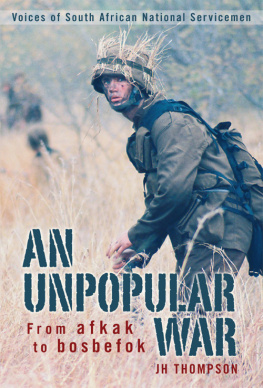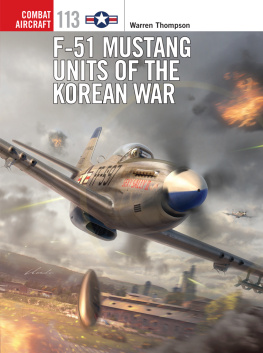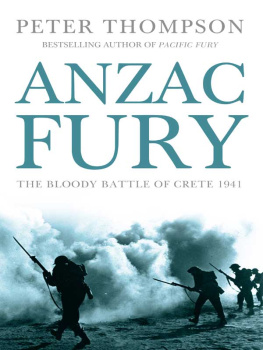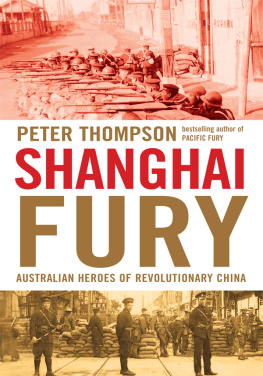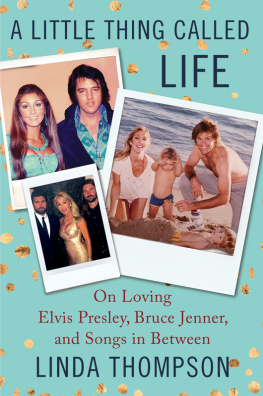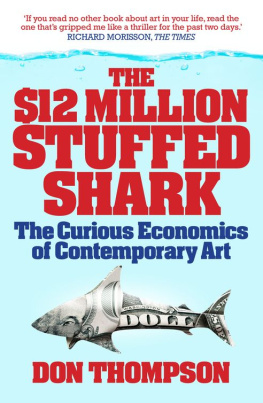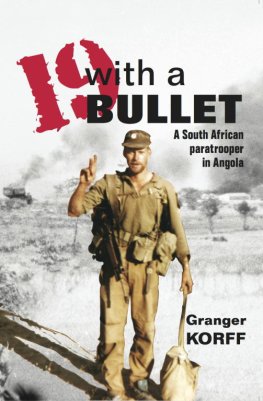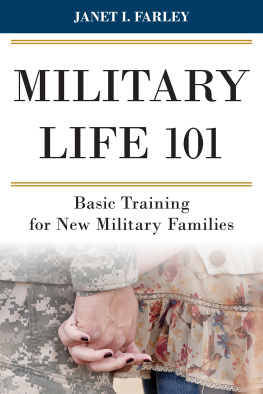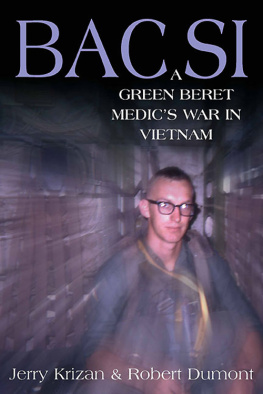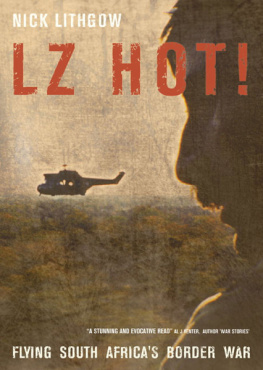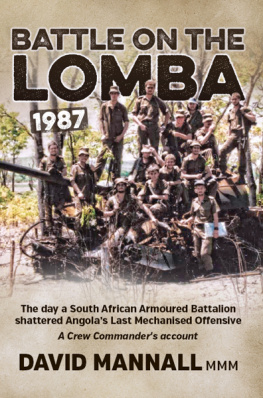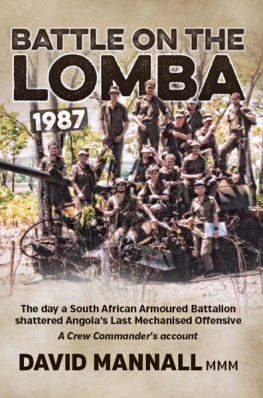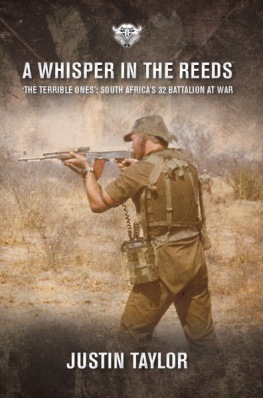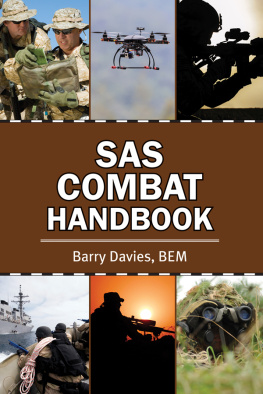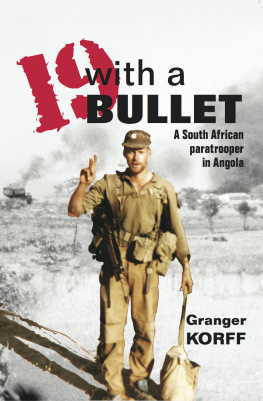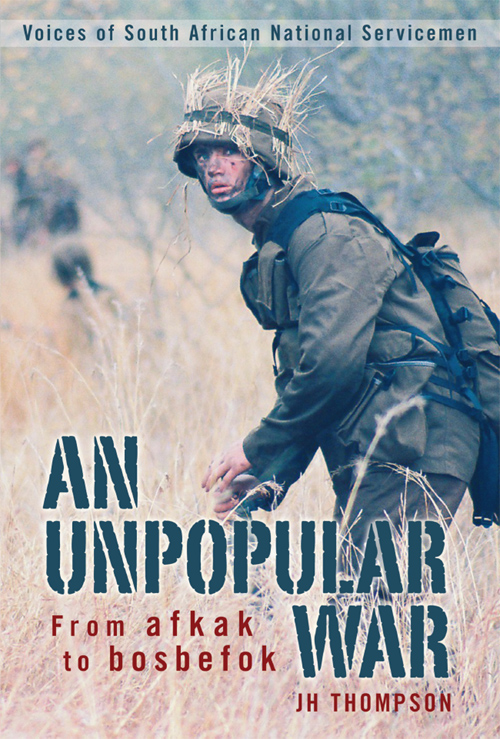An authentic snapshot of the profound effect national service had on those who served their country, rightly or wrongly; of the camaraderie and crap; idealism and idiocy; professionalism and bungling thats part of any military organisation or operation.
Thompson has captured every facet and succeeded in letting the different voices be heard, without bias or judgment. And in doing so, she has not only provided all South Africans with a critically important account of a forgotten time, but also lifted the lid on something that needs to be out in the open to finally be allowed to heal.
Kevin Ritchie, Saturday Star
Revealed at last: ex-national service soldiers shocking experiences.
You magazine
The first book of its kind in South Africa to unmask the private lives behind South African Defence Force soldiers.
People magazine
A riveting, personal look at recent South African history, and a poignant reminder of the multi-faceted effects of war on innocent youngsters.
Kate Turkington, joburg.co.za
AN
UNPOPULAR
WAR
AN
UNPOPULAR WAR
From afkak to bosbefok
Voices of South African
National Servicemen
JH THOMPSON

Published by Zebra Press
an imprint of Random House Struik (Pty) Ltd
Company Reg. No. 1966/003153/07
80 McKenzie Street, Cape Town, 8001
PO Box 1144, Cape Town, 8000, South Africa
www.zebrapress.co.za
First published 2006
Publication Zebra Press 2006
Text JH Thompson 2006
Cover photograph Christo Crous
All rights reserved. No part of this publication may be reproduced, stored in a retrieval system or transmitted, in any form or by any means, electronic, mechanical, photocopying, recording or otherwise, without the prior written permission of the copyright owners.
PUBLISHER: Marlene Fryer
EDITOR: Robert Plummer
PROOFREADER: Ronel Richter-Herbert
COVER DESIGNER: Natascha Adendorff-Olivier
ISBN 978 1 77007 301 2 (print)
ISBN 978 1 77020 121 7 (ePub)
ISBN 978 1 77020 122 4 (PDF)

Over 50 000 unique African images available to purchase from our image bank at www.imagesofafrica.co.za
Contents
Preface
History is not another name for the past, as many people imply.
It is the name for stories about the past.
AJP TAYLOR (19061990)
Until 1994, all white male South Africans were called up for National Service in the year they turned 18. This could be deferred for a few years if the person was studying, but to avoid it meant a jail term. In the 1970s, 1980s and early 1990s, hundreds of thousands of young men served in the military, most going through intense physical training and many of them being sent to fight the war in northern Namibia and Angola.
I interviewed over 40 men who were required to do National Service, in order to record their personal memories of this military era. This book is a collection of mental snapshots from their time as SADF conscripts: an inspection, the routine of camp life, the monotony and dread of patrols, the terror of a battle. Whatever the experience, it came with an intensity absent in civilian life. The men I interviewed spoke honestly of fear, boredom, loss, crying, drinking, fighting, of deep friendships and a yearning for the camaraderie they had then. Their stories also give an anecdotal record of the idiosyncrasies and slang from that period, and the way that these varied in different regions and units.
The interviews covered a wide range of experiences. The men spoke of life in the army, the navy and the air force. Some were chefs and medics, others were Recces and Parabats. One was a conscientious objector serving time in a military prison. A few of them stayed on for longer than their two years National Service, such as the helicopter pilots. Most are identified by their first name and their age at the time, although some preferred to remain anonymous. There are a few duplicate names but no false ones.
Even though most National Servicemen called up for military service did not experience combat, their time with the military had a profound and lasting impact on them. The war, fought primarily in South Africas protectorate South West Africa (Namibia) and in Angola, was an unpopular one on many fronts. Many young men, straight out of school or university, were not staunchly patriotic and did not want to give two years of their lives to the military, mothers didnt want to lose sons, and South Africas apartheid government was condemned internationally for fighting an unjust war.
It was a radically different political climate one that now, from the perspective of a non-racial and democratic South Africa, is almost impossible to comprehend. Today, it is not socially acceptable for these men to talk about their experiences. But even if the politics were abhorrent, this doesnt make the soldiers so.
These stories are their experiences as remembered by them. I wrote them as they were told, with no embellishment or editing to make them seem better men, or worse.
JH THOMPSON
Acknowledgements
It is not clichd at all to say that without certain people this book would not exist. Most obviously and most importantly are the men whom I interviewed. Thank you for trusting me with your stories and memories, without which I could not have written this book. This is not my book, it is yours.
I hope there will be many more books on the experiences of South African soldiers, for there are thousands of stories that should be told, in print, not just among close friends. For those of you who kept diaries or notes of your time as a National Serviceman get them to a publisher!
Whether it was a concern about reprisals, privacy or a more personal reason, some men requested to remain anonymous, while the rest agreed to the use of their first names in the main body of the book. I wish to thank every one of them. Some of the men whom I can list are Andy Thomas, Anthony Hansen, Christian Bowker, Christoph Hummel, Clint van Haght, Dave Keegan, David OSullivan, Ferdinand Taljaard, Jeremy Mansfield, John Scholes, John Walland, Martin Blignaut, Paul Redman, Paul Rotherham, Rick Venter. Thank you for the telling.
Thank you too to Kate Rogan for valuable insider information on the publishing industry, her guidance and encouragement. Lieutenant Colonel Taljaard for his invaluable information and checking of facts concerning the South African Air Force as well as military terminology geen toffies vir jou! Richard Henry, Curator Armoured Fighting Vehicles at the SA National Museum of Military History, who saved me hours and hours of trawling through reference books to check obscure Angolan towns or military hardware facts, thank you for your sharp eye and for sharing your vast knowledge on all things military. Baie dankie Zelda en Anton le Grange vir julle humor en ondersteuning met al die vertalings vir wanneer my feeble en verkrampte horskool Afrikaans my in die steek gelaat het! Dan Moyane for his cross-border phone calls to ensure that every single diacritical mark was accurate and in its correct place regarding the Portuguese translations.

